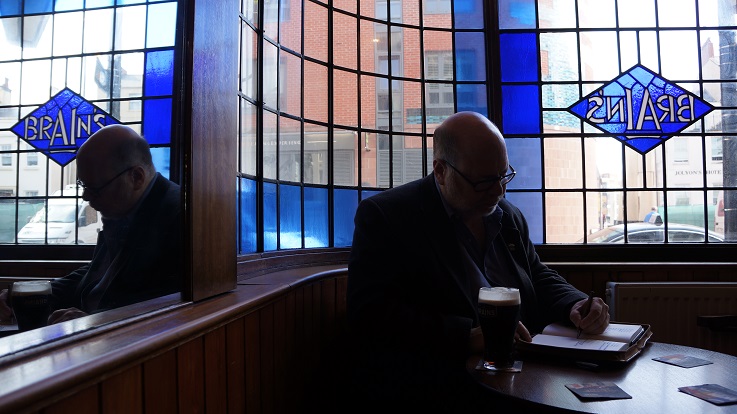 |
82. Notes on My Bereavement
Interspersed among my notes are to be found her notes, that awful illegible writing. We shared the same private journal. She frequently borrowed the little notebooks I always carry to make her own notes. Can I still laugh at the difficulty her handwriting gives me?
It has been more than three months since I held my cherished companion’s head in my hands. She died under my lips. She died against my forehead and cheeks. A last goodbye issued from my choked throat.
The problem is, reality is unbelievable. Reality places constraints on what can be believed. I felt a disgust for reality and wanted to take up some religion, any religion, to appease my despair. I am unable. Magical thinking makes sense if you want to be eased. What is the function of grief?
I know grief to be natural. I have observed it in other species. Why did it evolve; what survival value does it have? Why continue with anhedonia? For a while, food lost its taste. Only music prevailed during my melancholy.
A morning at three o’clock, unable to sleep, I took a stroll along the River Taff. Butte Park was closed for the night, but the trail along the west side of the river wasn’t. There was no one else and it was at times a pitch black abyss, except for the black pavement shimmering far ahead where there were no enclosing trees. I trusted the path to be straight and without holes. During the walk, I figured out grief.
Grief is not the hapless consequence of another agency. It is the instinctual expression of our emotion. We express it to inform society. Being social creatures, we are bound to each other by emotional needs and its manifestation in our visage informs, even alerts, others.
That I chose to grieve in privacy is an intellectual attempt to restrict the social response to my emotional need because I am not comfortable with receiving solace from just anybody. I diverted that expression of grief into my essays, which is also the way I preferred others to respond, through thoughtful writing. It fails to bring me physical intimacy, but that is exactly as I wish it, because any physical intimacy would fall short of the intimacy I had with Ms Keogh and this contrasting shortfall would only emphasize what I have lost.
My enjoyment of life has returned, although not as fully. The melancholy is no longer constant. I am grateful that I don’t need to admonish myself with regrets. There is no reason to reprimand myself for not having spent more time with her, for not having told her what she meant to me. I did all these things to the fullness of my power. Every day since her death, I gaze at her portrait. She had existed and light had bounced off her skin into my camera. I love her still and tell it to her portrait.
With friends gathered around a café table on a recent Friday night, I asked, “When will I have cried enough? When will I get it out of my system?” That same night Verdi’s La Traviata was being performed by the Welsh National Opera, the opera’s opening night at the Millennium Centre. A few good seats were still available and I wanted to go, but I couldn’t bring myself to risk it, not given the storyline and also it being Ms Keogh’s favorite opera. I didn’t want to make a spectacle of myself disrupting the performance with an uncontrollable outburst of lamentation. And when will it be safe for me to again see my favorite opera, La Bohème?
I have learned that since Ms Keogh died, I will not be allowed to remain in Wales without jumping through more hoops and spending more money. Another example of invasive reality that I need to confront, but this time not without hope. It is strange, this feeling that British Immigration wants to separate me from my wife. I know I am not being rational, yet that is how it feels. Ms Keogh no longer exists, so regardless as to where I am in the world, I cannot be any more separated from her than I am now. What difference does physical distance make? Still, it doesn’t change the way it feel about being too far from where she is buried and the plot next to hers is waiting for me. My solicitor has assured me that I won’t need his expensive services. He is confident that I can fill in the appropriate form and British Immigration will grant my wish to remain.
When I met Ms Keogh, there was no void in my life needing to be filled and I was content to live my life alone. I cannot go back to who I was before I met her. There was no void to fill when I met her, but her death has left me with a void. I will never again know the intimacy I once knew with Ms Keogh.
A letter from an Alaskan friend, more familiar with depression than I am, wrote, “You will continue to love Ms Keogh. You will always hold her memories close. You will transform.”
My Michigan friend, a Presbyterian minister, wrote to me, “You are not who you were before Ms. Keogh died. You are going to have to become someone new.” He lost his wife a year ago, says we belong to the same club no one wants to join.
A letter from my friend in Massachusetts assures me life will improve, but with ups and downs. Missing Ms Keogh “will arise intensely from time to time, I’m sure. Take it as a sign that your emotions are still alive and you have not retreated into a protective shell of apathy.”
When I was young, I lived in the future, dreaming about unrealistic windfalls of wealth and success. It was easier and comforting to dream about obtaining such “things” than it was straining and working to actually achieve those “things”.
Before I met Ms Keogh, I found the means for being content in the moment. It was while in that state of mind that fortune brought Ms Keogh into my path. It wasn’t Ms Keogh who taught me to live in the moment, but it was Ms Keogh that made every moment agreeable. The future held nothing more valuable than her companionship.
As a widower, it is the pull of the past that confounds me. I want to live in the past in a loop for eternity of that time she and I were together. But I am exiled from the past.
It is Thursday night as I bring this essay to conclusion. Thursday night is when they practice the bells at Saint John the Baptist Church, a two minute walk up The Hayes from where I live. I eat pizza with a glass of Chianti at an outside table across from the bell tower listening to them practice their six bells, sometimes all ten. I will not be doing that much longer. It is already nightfall and it is getting cold. It was while walking back from dinner that I was pervaded with an involuntary sense of well-being. Tears of happiness pooled in my eyes, followed by feelings of gratitude to Ms Keogh for bringing me here to Cardiff.
![]()
Mr Bentzman will continue to report here regularly about
the events and concerns of his life. If you've any
comments or suggestions, he would be pleased to hear
from you.
Selected Suburban Soliloquies, the best of Mr Bentzman's earlier series of Snakeskin essays, is available as a book or as an ebook, from Amazon and elsewhere.
